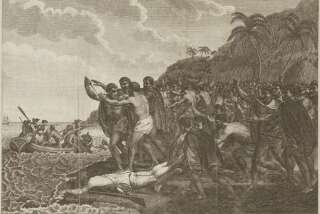A Place Like ... the Sky
- Share via
The president’s words -- “The Columbia is lost” -- were an echo of the perennial lament of our kind: part of his fleet has made it around the world, but Magellan did not; “Croatan” is all that’s left; Leichhardt has disappeared into the Australian desert; Scott did not make it back from the pole; we have lost contact with Earhart; Fisher lay down in the snow and died up there near the Everest icefall. The ship is lost, presumed sunken, crew dead or marooned. Lost.
If you look at the South Pacific on a map and imagine navigating it in a canoe, you begin to understand the monstrous difficulty and the perverse persistence of exploration, our history of slingshotting ourselves into the void: the people who didn’t return, and the people who, impossibly, did, and again embarked.
Imagine Egyptians setting out westward from the coast of Africa in a papyrus dinghy, or Irish monks seriously proposing to launch for Newfoundland in coracles, or astronauts roaring at 20,000 mph toward the ground in a glider loaded with explosives and you have an idea of what people will do to get out of where they are.
Exploring is something we have to do whether we like it or not, as when the Vikings made their way island by island -- Iceland, Greenland -- across the North Atlantic because they kept getting blown off course by ferocious storms.
Exploring is something we do whether we should or not: Of the people who lived here before Columbus, there are now mere shreds, and all that courage was also genocide.
Exploration may be aimed at knowledge and something necessary, as Darwin discovering on the Galapagos archipelago who we actually are. Or its purpose may be misguided or fantastic, like the Fountain of Youth and Cities of Gold that led Ponce de Leon on a delusional path of self-destruction through the peninsula he named Florida.
On Saturday, I heard someone on television say that human beings are the only living things that explore. But that seems completely wrong.
Anything with senses, with functions that respond systematically to the environment -- that is, all life -- explores. It keeps trying to exceed itself, and to do that it has to know where it’s going and what it’s working with. The very trees are explorers, though they take their time about it.
But there is indeed something human about human exploration, an artifact of consciousness: a great perversity, willfulness and destructiveness accompanied by an almost undetectable, homeopathic admixture of pure hope and love, an overwhelming stupidity and a perfect faith.
“I had ambition,” said Capt. James Cook, “to go not only farther than anyone had been before, but as far as it was possible for man to go.”
Reasonable estimates of survival rates are hard to make. But in 1620, as the Pilgrims set out for North America while various Europeans charted the Pacific, everyone knew that if you set out on a transatlantic voyage -- to say nothing of a circumnavigation of the globe -- you stood a pretty even chance of dying.
In order to precipitate themselves over that edge, people told themselves that it was God’s will, or that they had God’s protection, or that they were Israelites escaping the Pharaoh and searching for the Promised Land. In order to live again each day with their decision, they had to forget the odds and do their jobs.
Exploration is probably always an attempt to imagine an escape, the obsession with finding a way out, around or over to a place that seems purer, unsullied by the likes of ourselves: a place like ... the sky.
There are a few things worth dying for. That is one of them.
More to Read
Sign up for The Wild
We’ll help you find the best places to hike, bike and run, as well as the perfect silent spots for meditation and yoga.
You may occasionally receive promotional content from the Los Angeles Times.






